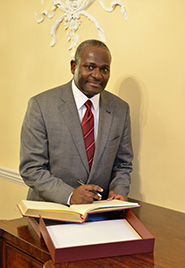
His Excellency Mr Carlos dos Santos
19 November 2013
Last week the University welcomed the High Commissioner from Mozambique, His Excellency Mr Carlos dos Santos, to deliver a Guest Lecture at Royal Fort House.
Mr dos Santos was in Bristol at the invitation of the Bristol Link with Beira (BLB) and had been invited by the School for Policy Studies to speak about the current and future development of Mozambique.
The Commissioner spoke of the difficulties faced by his government in trying to maximise the commercial opportunities offered by external investors attracted by the potential of the country’s natural resources (including oil, gas coal and titanium), while ensuring the benefits are shared with Mozambicans.
The audience included Professor Wendy Larner, Dean of the Faculty of Social Sciences and Law, academics, international and UK postgraduates, and guests of BLB. Questions were wide ranging and included Mozambique’s policies on women and disability; the prioritising of health care and education; the nature of central control on external investment; the divergence of Mozambican policies from World Bank expectations; and the Government’s development of their people as agents of change as well as beneficiaries.
Further information
Bristol has been twinned with the Mozambican city of Beira for over 20 years. This link developed from the Anti-Apartheid movement in the 1980s, in which University of Bristol staff and students played a leading role. Mozambique became independent in 1975 but 16 years of civil war, the deaths of over a million people and the displacement of millions of its inhabitants, on top of natural disasters, left the country devastated. When a peace deal was signed in 1992, Mozambique proved itself a unique example of successful resettlement, reintegrating unprecedented numbers of those who had fled the fighting. Mozambique is both one of world’s poorest countries and one of the fastest growing economies in Africa. Most of its population still lives off the land and attempts at a national infrastructure suffer from chronic under-investment and regular setbacks such the combination of floods in 2000\01 and droughts in 2002. Poverty is widespread, with more than 50% of Mozambicans living on less than $1 a day. By contrast, it also has some of the world’s largest sources of untapped oil and gas reserves, while coal and titanium are already a growing source of revenue. More information about the Mozambique High Commission is available at http://www.mozambiquehighcommission.org.uk.
